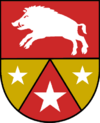Elections in Littland
 |
|---|
| This article is part of a series on the politics and government of Littland |
|
|
There are three types of elections in Littland: elections to the legislature (the Folkekammer), elections for the position of President and local elections to municipal and county councils. A referendum may also be called on matters of national concern and/or public importance.
Presidential elections
The president is elected for a six year term by popular vote. The current President Morten Kristoffersen won the 2022 Littish presidential election on 3 September 2022, the first presidential election to not go to a second round since 1998.
Parliamentary elections
According to the Constitution, the Prime Minister can call a snap election by asking the President to issue elections. The President can only call for early election at the request of the Prime Minister. The 2020 Littish parliamentary election took place on 18 November 2020.
The 325 seats in the Folkekammer is elected using proportional representation in the Constituencies of Littland. Due to the large amount of parties, coalition governments are the norm following elections. Usually, the leader of the largest party becomes Prime Minister however this isn't always the case.
Local elections
Every four years elections to municipal and county councils take place in Littlands 253 municipalities and 16 counties.
Malskland elections
Elections to the Malskland Assembly are held alongside local elections for municipal and county councils in Littland. The Assembly takes the place of a county council in these elections. The Malskland has different political parties than the rest of Littland but follows the same electoral rules.
Referendums
The Constitution of Littland requires a referendum to be legally binding and can only be called by the President at the behest of the Folkekammer.
As of 2020 there has been 5 national referendums:
- Lower voting age to 18 (1934, rejected)
- Lower voting age to 18 (1941, accepted)
- Adoption of Malskic as a second official language (1953, rejected)
- New Constitution (1986, accepted)
- County Reform Proposal (2004, accepted)
Additionally, 14 local referendums took place in 2003 and 2004 as part of the County Reform, relating to merging on municipalities and counties.
As referendums are legally binding, the result is required to be discussed and enacted upon in the Folkekammer.
See also
- Politics of Littland
- Government of Littland
- President of Littland
- List of political parties in Littland
- Historical composition of the Folkekammer
